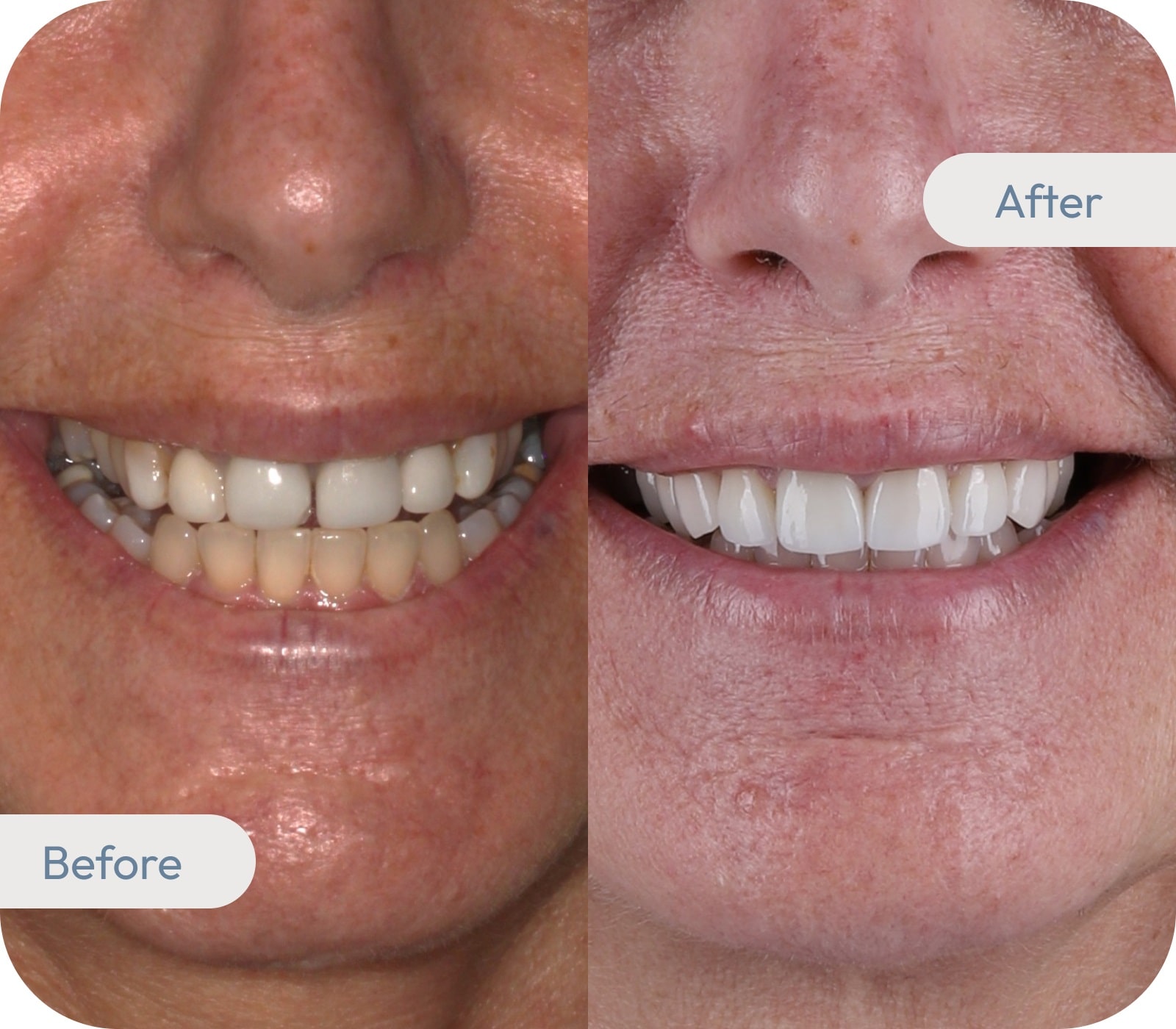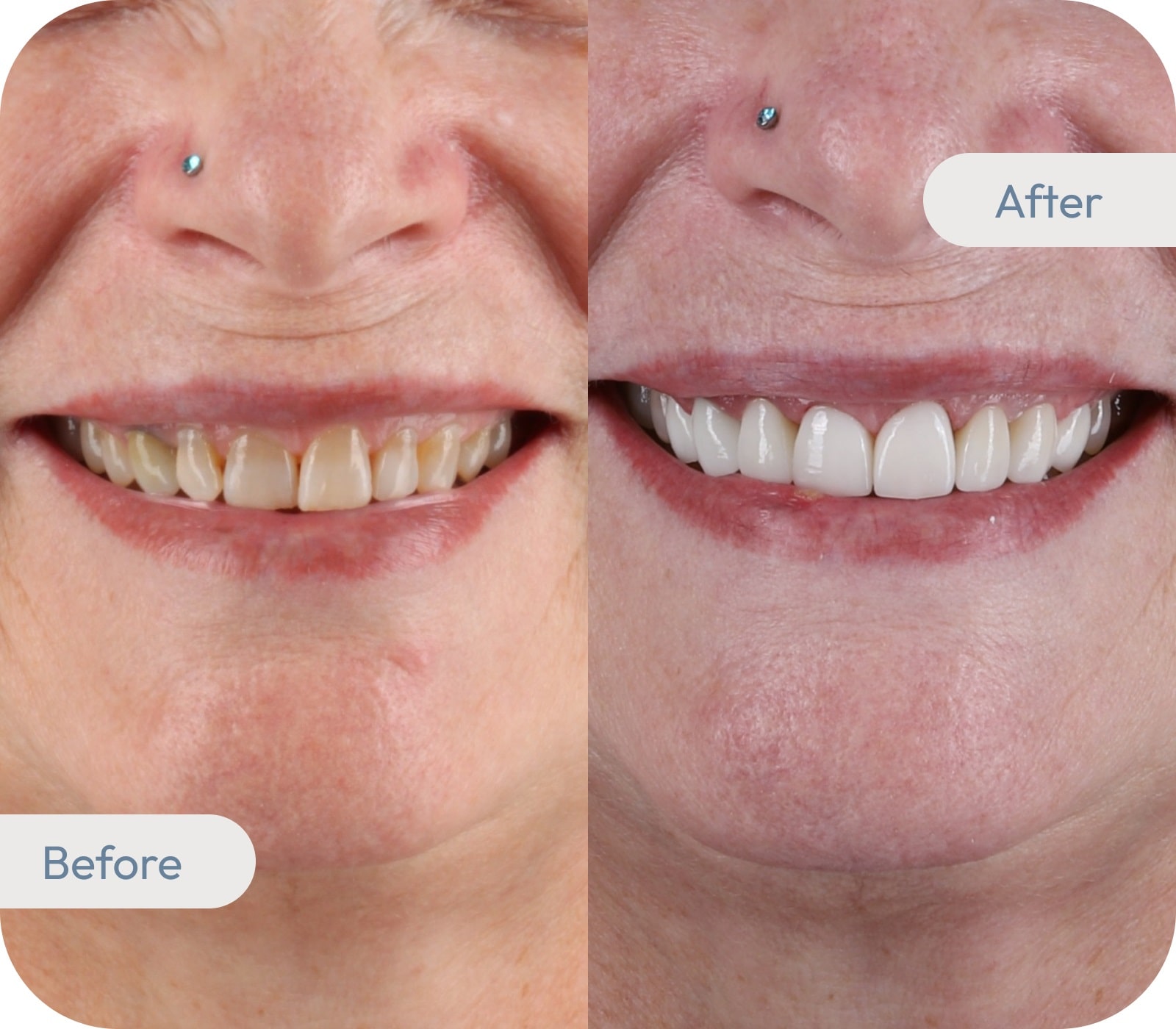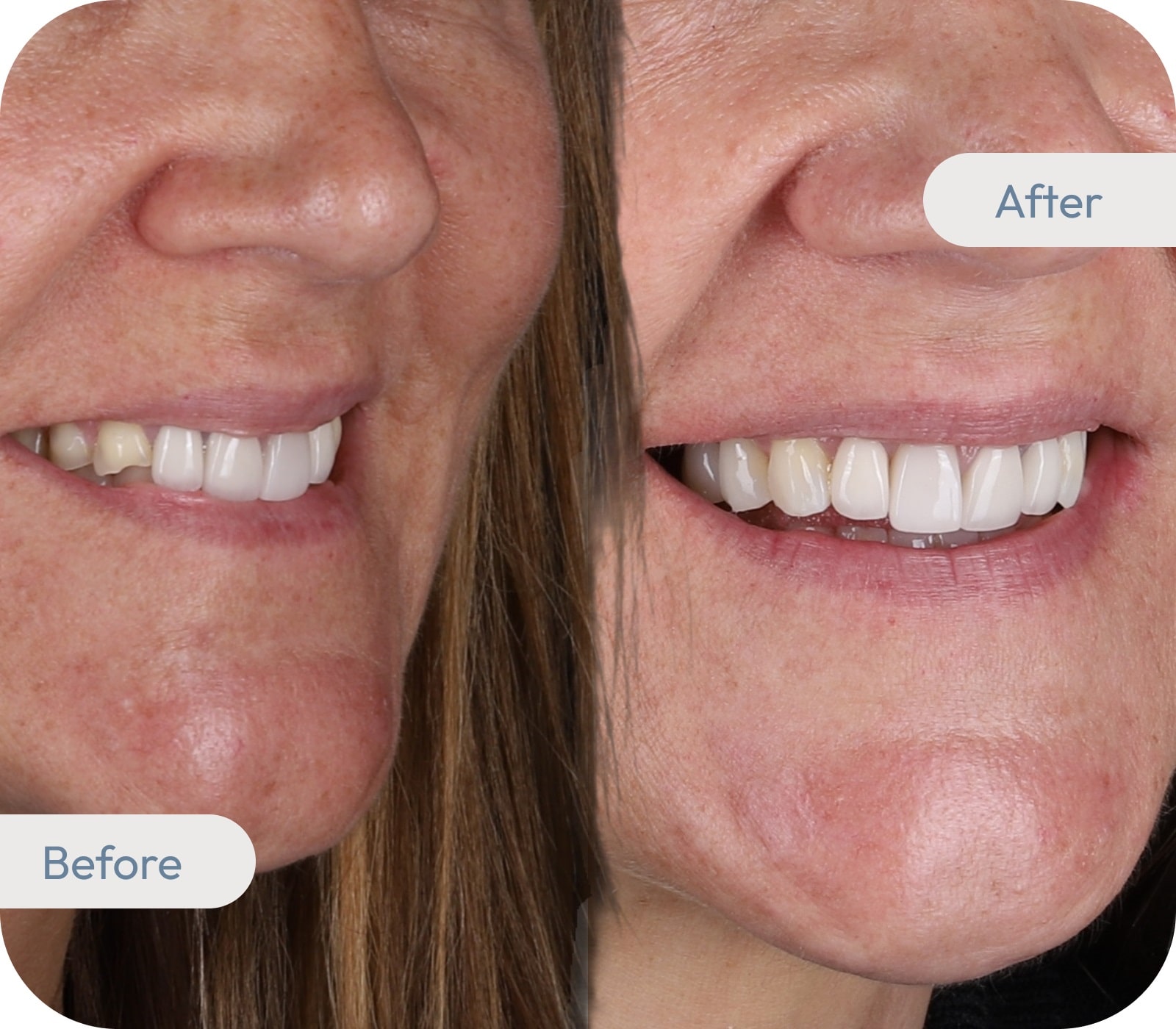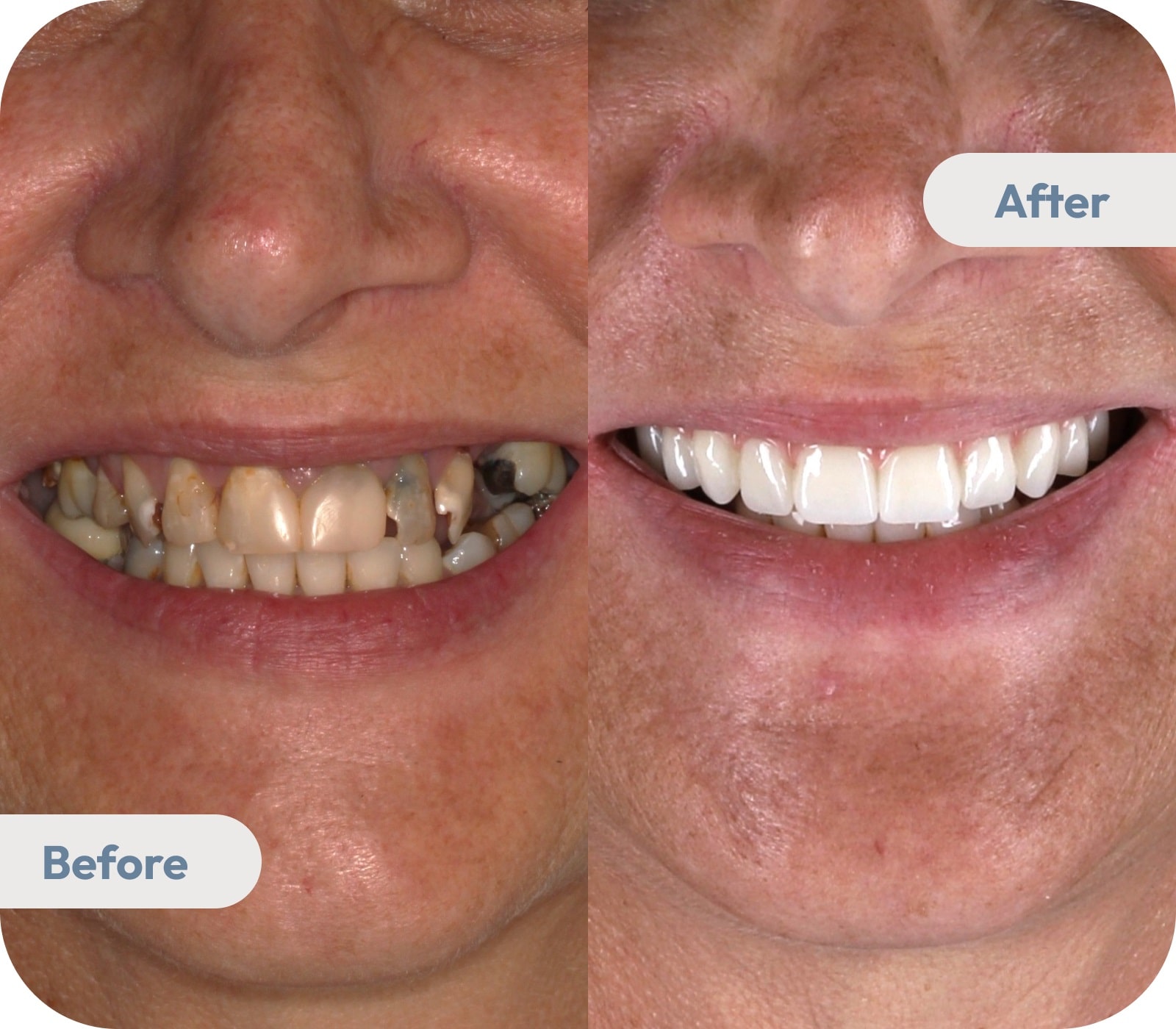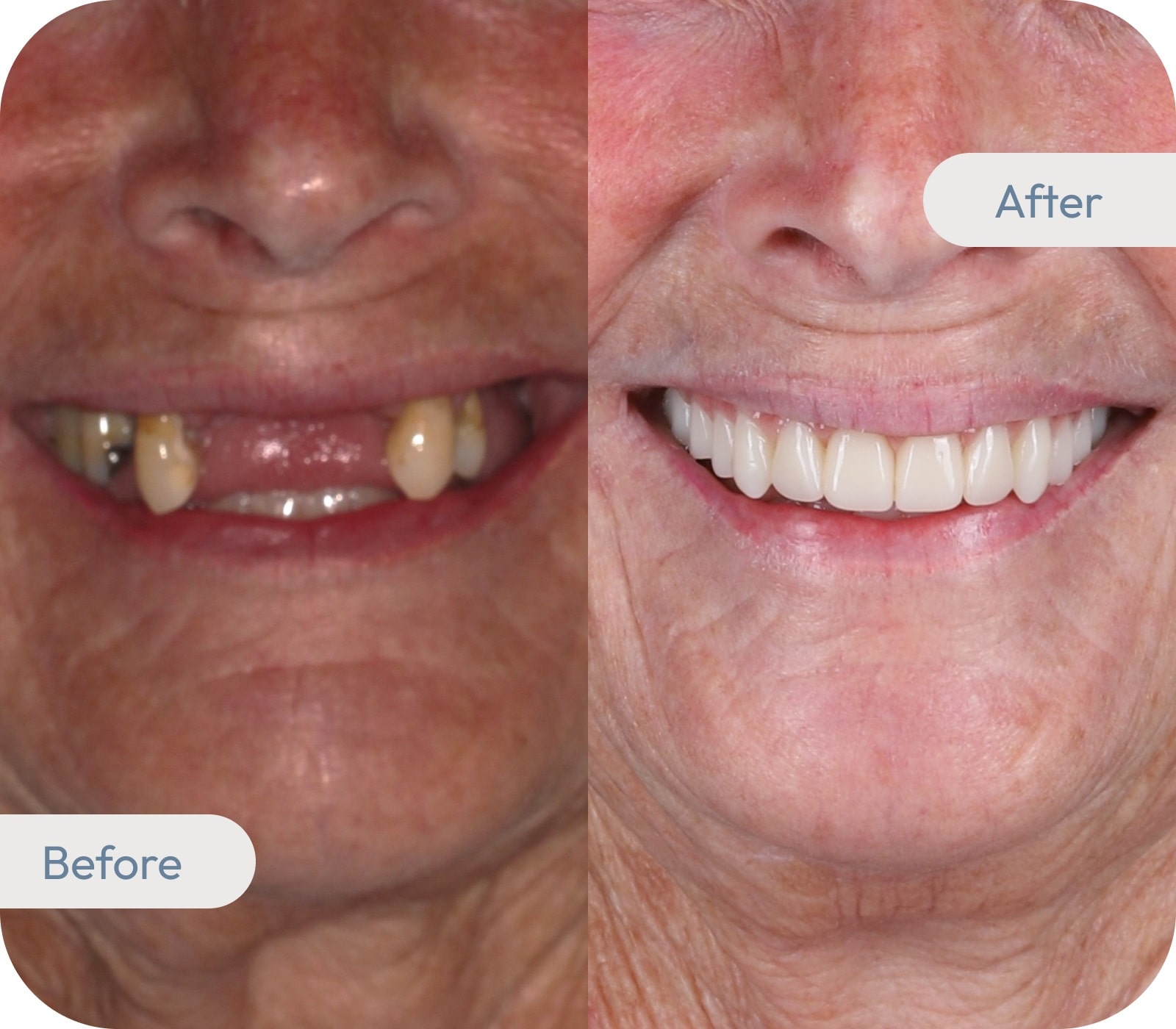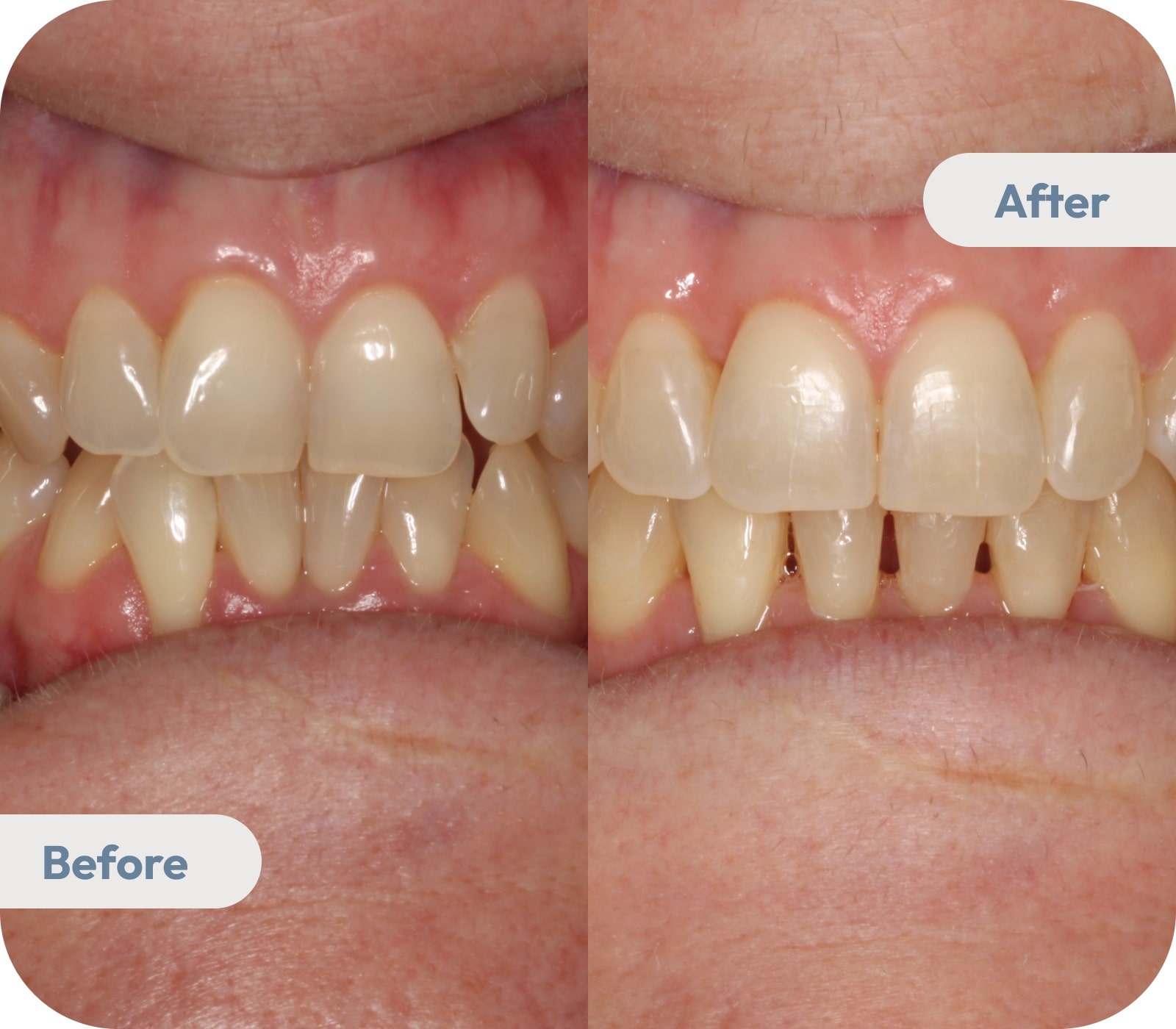Supporting Long-Term Oral Health
Your Guide to Dental Implant Care
and Maintenance

Understanding Implant Integration and Aftercare
Daily Care Tips for Your
Dental Implants
- Gentle Brushing
Brush your teeth twice daily using a soft-bristled manual or electric toothbrush. Focus on cleaning around the implant crown and gumline without using excessive pressure, which may contribute to irritation of the gum or surrounding tissues.
- Daily Flossing
Floss daily using unwaxed floss, floss threaders, or specially designed implant floss. This helps remove food particles and plaque between teeth and implants, reducing the risk of inflammation or infection near the gum line.
- Regular Check-ups
Book routine dental visits every 6 to 12 months or as recommended. Your dentist can monitor the health of the implant, clean hard-to-reach areas, and identify any early concerns like gum changes or bone loss.
- Avoid Hard Foods
Limit chewing on hard items like ice, unpopped popcorn kernels, or hard nuts. These can place stress on the implant restoration and surrounding areas. Over time, this stress can potentially lead to cracks, chipping, or wear.

What to Expect from Your Implant Maintenance Visits at Eversmile Dental
From the moment you arrive, you’ll be greeted by our team in a professional and supportive environment. The check-in process is straightforward and designed to be efficient. If you’re feeling nervous, you’re not alone; our team takes the time to understand your concerns and explain each step clearly. Your visit begins with professional care and respectful consideration for your individual needs, with a focus on clear communication throughout your appointment.
During your dental implant maintenance visit, the dentist will perform a detailed visual examination of the implant, gums, and surrounding tissues. They’ll check for signs of inflammation, redness, bleeding, plaque build-up, or early indicators of peri-implantitis. Identifying these concerns early allows for timely care. This proactive approach may help maintain implant stability, support gum health, and reduce the risk of complications over time.
During your maintenance visit, the team will gently clean around the implant crown and abutment using implant-compatible instruments, including the EMS Airflow system. This air-polishing technology is designed to remove plaque and biofilm while minimising impact on the implant or surrounding tissues. The process uses methods appropriate for implants and is adapted to the clinical requirements of each patient. Preventive cleaning may help reduce the risk of peri-implant inflammation and contribute to maintaining gum and implant health over time.
To monitor the health of your implant, the dental team may use advanced tools like CBCT scans when clinically appropriate. This 3D imaging helps assess bone stability and detect early changes that standard X-rays might miss. Intraoral scanners may also be used to digitally track gum contours or prosthetic fit. These technologies may assist in evidence-based care by enabling detailed comparisons and personalised treatment planning at each maintenance visit.
At the end of your visit, you’ll receive personalised advice based on your current oral health and implant conditions. Such recommendations may include updates to your cleaning routine, suggestions for diet or lifestyle changes, or scheduling follow-up care. Every recommendation is tailored to support your oral health needs and may assist in maintaining implant function over time. Eversmile Dental provides individualised care to support patients in managing their oral health and implants at different stages of treatment.
Smile Gallery – Before and After Treatment Examples
*These images display actual patients of our clinic. Every case is different, and treatment outcomes can vary according to individual conditions and needs.
Our Approach to Dental Implants in Bunbury
Dental implants are a treatment option to restore chewing function, support speech, and replace missing teeth. At Eversmile Dental, we provide evidence-based implant care in a professional and supportive environment. Treatment is planned carefully, with long-term oral health as the priority.
-
- Dental Care for the Bunbury Community
- Our team lives and works in Bunbury, and we are committed to supporting the oral health needs of our local community. We provide care that is respectful, professional, and guided by our long-standing connection to the community.
-
- Providing Dental Implant Treatment in Bunbury Since 2006
- For almost two decades, we’ve provided dental implant treatment for patients in Bunbury and the South West. With advanced training and clinical experience, our implant dentists plan and place implants using evidence-based methods. Treatments are designed with a focus on function, appearance, and maintaining oral health over time.
-
- Implant Dentistry Tailored to Patient Needs
- Dental implants are about more than just restoring function—they help restore chewing and speech function and replace missing teeth. At Eversmile Dental, we take a patient-focused approach to care for individuals. We focus on building a strong, healthy foundation, understanding your goals, and providing treatment that fits seamlessly into your lifestyle.
-
- We Listen First—Then We Plan Together
- Every implant treatment is different. That’s why we start with a conversation. We’ll guide you through your options with clear information about possible risks, benefits, and costs. You’ll have time to ask questions, feel heard, and make a decision you’re completely comfortable with.
-
- Ethical and Patient-Centred Care
- We are committed to providing patients with clear information and supporting informed decision-making about treatment. If implants are right for you, we’ll guide you through the process with skill and care. If they’re not, we’ll tell you and offer alternative options.
-
- Digital Technology for Implant Planning and Placement
- From CBCT to digital planning and in-house 3D printing, we use modern technology to assist in the planning and placement of implants. These tools support accurate treatment planning and efficient appointments. You don’t need to travel far for modern dental services—it’s available here in Bunbury.

Consistent Care for Your Dental Implants
Keeping up with dental implant care is simpler and more convenient when it’s close to home. At Eversmile Dental, patients in Bunbury, Australind, Dalyellup, and Eaton have access to consistent, professional support without the stress of travelling long distances like Perth for routine maintenance.
From check-ups and cleaning to careful monitoring, we provide implant care accessible and professionally delivered. Book a consultation to discuss dental implant care and maintenance tailored to your oral health needs.
Explore Our Dental Implant Information Pages
Frequently Asked Questions
Do dental implants require routine maintenance like natural teeth?
Yes, dental implants benefit from ongoing care, just like natural teeth. Daily hygiene and regular visits help maintain their condition. Here’s why dental implant care and maintenance are important for long-term success:
- Plaque and bacteria can build up around implants:
Like natural teeth, plaque can collect around implants. The buildup may lead to gum irritation if implant maintenance is overlooked. - Daily cleaning helps protect the surrounding gum tissue:
Brushing and flossing are key to good dental implant care. Consider using an implant-specific toothbrush or soft interdental brush. - Professional check-ups help identify issues early:
During dental implant check-ups, your dentist monitors bone levels and gum health around the implant. Early intervention supports stability. - Neglecting aftercare can lead to inflammation:
Even though implants aren’t prone to decay, peri-implant disease is a risk if implant maintenance routines lapse. - Implants require the same care as your other teeth:
Follow the same daily practices as you would for natural teeth. Think of this as part of a complete oral care plan.
If you’re uncertain how to clean around your implant, seek a dentist’s advice tailored to your needs. They can guide you on effective tools and techniques.
What is the proper maintenance routine for dental implants?
A consistent care routine may help maintain gum health and support implant function over time. Here are some important tips for maintaining implants day to day:
- Brush twice a day using a soft-bristled toothbrush:
Angling the brush towards the gumline helps clean the dental implants while being gentle on surrounding tissue. - Use implant-specific floss:
Flossing is an important part of cleaning dental implants thoroughly and reducing plaque between implants and natural teeth. - Use interdental brushes or water flossers if recommended:
These tools can help clean hard-to-reach areas around your implant. Always follow personalised instructions from your dental team. - Attend scheduled appointments for professional monitoring:
During your dental implant check-ups, your dentist will monitor gum health and the condition of the implant using specific tools and scans. - Ask your dental team for personal advice:
Ask your dental team for guidance on specific products or techniques that fit your daily care routine. If you’re not certain how to look after dental implants, they can recommend oral hygiene aids appropriate to your clinical needs.
How do you clean around a dental implant at home?
Daily cleaning helps protect the soft tissue around your implant and may assist in maintaining gum and bone health over time. Here’s how to care for your implant at home:
- Brush gently along the gumline and around the implant crown:
Angling the brush towards the gumline helps with cleaning dental implants thoroughly while being gentle on surrounding tissue. - Choose a non-abrasive toothpaste:
Whitening or charcoal pastes may wear down implant surfaces. A gentle formula helps protect the crown while cleaning effectively. - Use single-tuft or angled brushes for precise cleaning:
hese brushes can reach tight areas around the implant that standard toothbrushes might miss, especially near the gumline. - Rinse with an alcohol-free mouthwash or saltwater solution:
Rinsing may help reduce bacteria and inflammation and can form part of daily implant care when brushing and flossing aren’t enough. - Set a consistent routine for daily care:
Set a consistent routine for daily care. Your dental team may provide dental hygiene tips after implants based on your home care habits.
What type of toothbrush is recommended for dental implants?
A soft-bristled toothbrush is generally recommended for cleaning around dental implants. It may assist with plaque removal while reducing the risk of irritation to the implant surface. Here’s why a soft brush is a suitable choice:
- Minimises abrasion:
Hard bristles or abrasive brushing may damage the implant crown or irritate the surrounding soft tissue. Soft bristles may reduce that risk. - Supports plaque removal:
When used with small strokes at the gumline, a soft-bristled toothbrush assists with cleaning implants when used along the gumline. - Suitable for daily use:
A soft brush can be used twice daily, including by patients with sensitive gums or recent implant placement, unless otherwise directed by a dental professional.
Can I use mouthwash or toothpaste on dental implants?
Yes, you can use both mouthwash and toothpaste with dental implants, but not all products are suitable for daily use. Here’s what to keep in mind:
- Use a non-abrasive toothpaste:
Toothpastes with charcoal or strong whitening agents may wear down the implant crown. Choose a low-abrasive formula that may help reduce wear on the surface. - Avoid toothpaste with harsh ingredients:
Ingredients like baking soda or stannous fluoride may be too abrasive for daily implant care. Look for gel-based or sensitive formulas instead. - Choose an alcohol-free mouthwash:
Alcohol-based rinses may dry out the soft tissue around the implant. An alcohol-free option may be less irritating to the soft tissue around implants. - Use mouthwash to support your daily cleaning routine:
Rinsing helps reduce bacteria and is generally recommended as a complement to brushing and flossing.
Can food get stuck under or around dental implants?
Yes, food can sometimes become trapped around or between dental implants, especially near the gumline or adjacent teeth. This is more likely if the spacing is slightly uneven. If left in place, food debris may irritate the surrounding gums. Over time, this may contribute to plaque buildup or local discomfort.
In some cases, small gaps around the implant may naturally allow food to collect. If this happens often, your dental team can assess the area and discuss whether additional care or monitoring is needed.
How do you prevent food from getting trapped around implants?
While food getting trapped around implants is common, a few daily habits may help reduce buildup and keep the area clean. Here are some ways to minimise food accumulation:
- Brush carefully around the gumline:
Pay extra attention when brushing near the implant crown. This helps remove leftover food that may cling to the gum margin. - Floss daily using implant-friendly floss or tape:
Flossing between your implants and neighbouring teeth helps clear trapped particles and may assist in maintaining gum health. - Use interdental brushes to clean narrow spaces:
These small brushes may assist in removing food between the implant and adjacent teeth where standard brushes can’t reach. - Consider a water flosser after meals:
A gentle water stream may help dislodge food debris, especially from hard-to-reach areas around the implant. - Chew slowly and rinse after eating:
Slower chewing may help reduce how much food gets forced between teeth. Rinsing with water may help remove lingering particles.
What foods should I avoid after getting implants?
Right after implant placement, certain foods may slow recovery or increase the chance of irritation near the surgical site. Here’s what not to eat with dental implants, especially during the early recovery phase:
- Hard or crunchy foods:
Foods like nuts, chips, and raw vegetables can put pressure on the implant site and may cause discomfort and affect the recovery process. - Sticky foods:
Avoid caramels, lollies, or dried fruit. These can cling to the surgical area and are harder to remove with gentle cleaning. - Chewy meats or bread:
Tough or dense foods like steak or crusty bread may strain your jaw and put stress on the healing implant. - Spicy or acidic items:
Hot sauces, citrus, and vinegar-based dishes may irritate the gums around the implant in the early stages of recovery. - Very hot foods and drinks:
Excess heat may interfere with recovery and cause irritation at the implant site.
Why do my implants hurt when I eat?
Dental implants are generally expected to function without pain once healed, so pain during eating may indicate irritation or an issue worth checking. If discomfort continues, schedule a review. Your dental team may suggest further checks as part of your regular check-ups for implant longevity, which focus on monitoring implant condition and supporting oral health over time. Here are some possible reasons:
- Healing is still in progress:
Mild discomfort can occur in the first one to two weeks after surgery. During this time, stick to soft foods like yoghurt, scrambled eggs, or mashed vegetables. - Trapped food or plaque:
Food debris between the implant and adjacent teeth may irritate the gums. If food gets stuck and presses against the gums near the implant, it can cause localised tenderness or inflammation. Regular cleaning is part of good dental implant care and may help reduce this risk. - Bite alignment changes:
If your bite has shifted or opposing teeth apply uneven pressure, discomfort during chewing may occur. - Signs of inflammation around the implant:
Ongoing pain may indicate irritation in the surrounding tissue. It’s a good idea to bring this up during your next dental visit for assessment.
How long do dental implants last with proper care?
Dental implants are designed to be a long-term option for replacing missing teeth, but their lifespan can vary from person to person. The implant post, which is placed into the jawbone, has the potential to function for many years with consistent care, though outcomes vary. In some cases, implants may remain stable for extended periods when supported by healthy gums and good oral hygiene. The crown, bridge, or denture attached to the implant generally lasts between 5 and 15 years. These components are exposed to daily wear and may need replacement over time due to normal use.
Practising good oral hygiene, attending regular dental visits, and avoiding habits like teeth grinding or smoking may help maintain implant health over time.
How long does it take for dental implants to fully heal?
Healing after dental implant placement happens in stages, and the timeline can vary depending on individual factors and treatment complexity.
- Initial healing (soft tissue) – 1 to 2 weeks:
This includes healing of the gum area around the surgical site. Many patients are able to return to normal daily activities within this period, though recovery varies. - Osseointegration (bone integration) – 3 to 6 months:
During this stage, the implant post integrates with the jawbone to provide support. This phase is important for ongoing function, though timing can vary. - Abutment healing – 1 to 2 weeks:
After the post integrates, a small connector called an abutment is placed. The gum tissue around this area needs time to heal before fitting the final restoration. - Final adjustment – 1 to 2 weeks:
Once the crown, bridge, or denture is placed, the gums and bite may need a short period to adjust. During this stage, the gums and bite may require a short period to adjust before the final restoration feels stable in function.
What are the signs that something is wrong with an implant?
While many implants function well after placement, there are certain signs that may indicate a problem and should be checked by your dental team. Common signs to watch for include:
- Pain or discomfort that doesn’t improve:
Some tenderness is expected after placement, but ongoing or sharp pain may signal an issue with the implant or surrounding tissue. - Swelling, redness, or bleeding around the implant:
Persistent inflammation around the gum area may suggest irritation or infection and should be assessed promptly. - Looseness or movement of the implant or crown:
If the implant or the attached restoration feels unstable, it may indicate a problem with the fit or the bone support. - Bad taste or odour that doesn’t go away:
This may be caused by trapped debris, bacteria, or inflammation around the implant site and should be checked by your dental team as soon as possible. - Difficulty chewing or changes in your bite:
Sudden changes in how your teeth fit together or discomfort while chewing may be a sign of a complication related to the implant.
Do I still need to visit the dentist regularly with implants?
Yes, regular dental visits are still important even after dental implants have been placed and healed. Aftercare for dental implants includes more than daily brushing and flossing. Regular visits allow for professional cleaning, X-rays if needed, and early detection of any changes. This ongoing care may assist in maintaining implant function and detecting changes early.
Your dental team can also provide guidance on how to look after dental implants at home. This may include tips on cleaning tools and daily habits to help reduce the risk of complications. Routine visits are an important part of monitoring your implant and overall oral health over time.
Various Payment Options Available
Book Your Appointment Online or Call Our Bunbury Dental Clinic
Book an appointment with our dentist in Bunbury to discuss your oral health needs. We provide tailored dental treatments and clear information to support informed decisions about your dental care.
